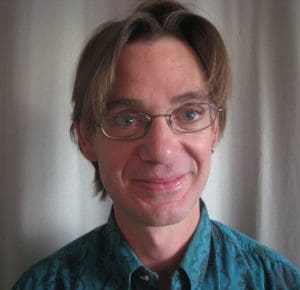 Tell us about yourself and how many books you have written.
Tell us about yourself and how many books you have written.
I’m a writer and a nursery-hand. Once upon a time, I was a musician and a cook. I’m a country boy living in the city, a working class intellectual, a cynical optimist, a Doctor of Literature who avoids academia, an outdoorsy bookworm, a highly-motivated daydreamer, a lover not a fighter, a hippy who eschews dreadlocks, tribal-chic, drum circles and earnestness.
I’ve also written two books: the deeply Australian post-apocalyptic tale The Rain Never Came, and the giant-monster story-cycle We Call It Monster.
What is the name of your latest book and what inspired it?
My latest book is entitled We Call It Monster, and is a story-cycle that aims to take giant monsters/Kaiju seriously.
I’ve always been fascinated by giant monsters, and I’ve always been a voracious reader (and sometimes an obsessive one). I’ve also been known to occasionally get my nerd on for a particular sub or micro-genre, looking up ‘similar title’ and ‘you might also like’ lists online when I should be doing better things with my time. But I still keep searching, because there can’t just be one example of Mystery Sub/Micro-genre X out there.
Giant monster fiction was one such obsession that carried me away, the timing of which coincided with the completion of my first book. I binged on literally anything I could find, looking for something that took giant monsters as seriously as some of the movies do, something that was more than just capital-A action. I found lots of fun, post-modern stuff out there – some of which could even be described as zany – but not much that approached giant monsters with a serious eye.
Looking for a new book to throw myself into writing – a book that I wanted to be distinctly different from my first book – I decided upon a piece of serious giant monster fiction. In other words, I decided to write the book that I wanted to read. Isn’t that what an author does?
Do you have any unusual writing habits?
I write part-time, and work part-time at my ‘real’ job. I enjoy this balance, as my real job is as a nurseryhand and is very physical – I spend the whole day on my feet walking-walking-walking, and do a lot of lifting and lugging. It’s a great way to shake off the stiffness and soreness that inevitably settles in after a day spent sitting in front of a computer or hunched over a notebook. What it means, though, is that my writing routine is flexible dependant on deadlines that are due and the mood I’m in – I always start early, but what I start is a different story, as is how I structure the day. If I’ve decided to focus on creative writing – rather than, say, one dedicated to admin or book publicity or research – I’ll set the whole day aside and aim to just produce a good amount of content, rather than set myself a specific target. It’s easier that way, and you can run free more rather than get locked down.
What authors, or books have influenced you?
I’m influenced by those writers who possess a singular ‘voice’ and focus on the emotional states of their characters, and on their characters’ psychological development. Within the same genres I work in, these kinds of writers normally use their science fiction ideas to further an exploration of those states and feelings that unite us all as people, rather than as an end unto themselves. These are writers like JG Ballard, Michel Faber, Frank Kafka, Katherine Dunn, Kurt Vonnegut, William Kotzwinkle, Debra Biancotti, Steven Amsterdam and Margaret Atwood – their work is truly memorable for the way it makes us feel, rather than the way the make us think, something only made people by these deep humanistic explorations.
What are you working on now?
Too many things! I like to have a lot of projects on the go at once—the trick is knowing which one to focus on first, something I’m not that good at. And so right now, I’m trying to work steadily on two different books – an Australian-set piece of climate fiction about family and friendship, and an offbeat piece of metafictional science fiction – while at the same time planning a post-apocalyptic western.
Do you have any advice for new authors?
There’s as much advice for aspiring authors out there as there are aspiring authors, but I’ll share a way of thinking that works for me. Writing a good book only takes a few things: a spark of talent that can be nurtured, an idea that can become a story, and discipline and routine, as well as a lot of time and a job that allows you that.
Find these things, and you’ll get there.
What are you reading now?
I have what you would probably call a magpie-mind when it comes to my reading. Although I primarily write speculative fiction, science fiction and post-apocalyptic fiction, I’ll read anything that has the promise of literary potential: realist fiction, westerns, YA fiction, horror, literary fiction, thrillers, non-fiction and, obviously, speculative fiction in its all myriad forms. I’ve even been known to read the odd romance.
I also tend to usually have a couple of books on the go at the same time. And so to finally answer your question, right now I’m reading Fortress of Solitude by Jonathan Lethem (a beautiful and epic work that combines a love of music and a love of superheroes), and the anthology Rock On: the Greatest Hits of Science Fiction (a collection of speculative fiction short stories that, in some way or another, are all about music).
Author Websites and Profiles
Lachlan Walter Website
Lachlan Walter’s Social Media Links
Goodreads Profile
Facebook Profile
Twitter Account